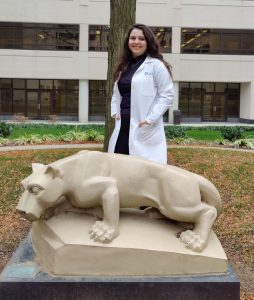College of Medicine strategic plan team highlights exceptional graduate students

Penn State College of Medicine’s Strategic Plan Team has launched a “Did You Know?” series to increase awareness of and bring attention to the many education efforts ongoing across our interdisciplinary campus. By learning more about one another’s work, we can more readily celebrate and collaborate with each other.
We’re kicking off the series by highlighting our exceptional graduate education programs. The College of Medicine sponsors eight doctoral programs and seven master’s programs. Together, these programs provide education to over 300 international students in disciplines ranging from anatomy to epidemiology to microbiology.
Meet two students who exemplify the excellence of our graduate programs.
Rachelle Saint-Fort, anatomy graduate program
Rachelle Saint-Fort is a second-generation Caribbean-American PhD student who came to the College of Medicine in 2019 from Tallahassee, Florida. In the lab of Keith Cheng, MD, PhD, Rachelle takes advantage of the lab’s optimized lens/camera imaging pipeline, incorporating anatomy and machine learning applications into her research work.
Specifically, Rachelle uses a 3D form of histology called histotomography based on the principle of X-ray microtomography. This imaging modality enables Rachelle to computationally analyze fixed, centimeter-wide whole organisms (such as zebrafish, water flea, axolotls and lower species) at a high resolution to define and characterize micron-scale morphological phenotypes across specific cell and tissue types. Through this quantitative work, Rachelle aims to facilitate a better understanding of the link between specific phenotypes and their causal genetic, environmental and disease factors.
Apart from conducting research, Rachelle has presented at various conferences such as the 10th Aquatic Models of Human Disease Conference, where she received second place for “Best Poster” award. She is also a grant recipient of the Ruth L. Kirschstein National Research Service Award to Promote Diversity in Health-Related Research and was recently appointed to the Woodward Center for Excellence in Health Sciences Education’s Student Educator Award Committee and the Zebrafish Disease Models Society’s Diversity, Equity and Inclusion Committee. Outside of research, Rachelle actively participates in various student groups including the Diverse Graduate Student Group, the Graduate Student Association’s Community Service Committee, and other activities with Minorities in Medicine and Project Fellowship. Rachelle has also cultivated a passion for education as an anatomy teaching assistant for medical and physician assistant students. She hopes to continue to chase this passion for educating and connecting with students when she graduates.
Mariam Melkumyan, neuroscience graduate program
Mariam Melkumyan is an international PhD student from Armenia who matriculated in 2019 and successfully defended her dissertation in December 2023. Mariam achieved an outstanding academic record and received numerous prizes and accolades including: the Graduate Alumni Society Award; Graduate Alumni Endowed Scholarship; Karl H. Beyer Jr. MD, PhD Scholarship; numerous travel awards; and the PA Options for Wellness Student Award. In addition to her PhD in neuroscience, Mariam completed the Clinical and Translational Sciences Dual-Title PhD Program. She was also an extremely active leader in the program as a student representative for the neuroscience advisory committee and in the Graduate Student Association (GSA). As part of the GSA, Mariam was the co-chair of the Graduate Student Forum in 2022 and the chair of the fundraising committee in 2022-2023. Mariam was also involved in other education and research activities: She was the coordinator for the annual Brain Bee competition, the junior mentor program coordinator for the Summer Undergraduate Research Internship Program and most notably, the editor-in-chief for the Lions Talk Science graduate student blog.
In the lab of Yuval Silberman, PhD, Mariam studied the role of central amygdala astrocytes in alcohol use and the effect of cannabinoids on alcohol-withdrawal induced anxiety. She utilized techniques such as whole-cell patch clamp electrophysiology, calcium imaging, immunohistochemistry and behavioral experiments. In addition to research, Mariam enjoyed mentoring junior graduate and undergraduate students. Mariam will be a postdoctoral researcher in the lab of Hee-Yong Kim, PhD, at the National Institutes of Health’s National Institute on Alcohol Abuse and Alcoholism beginning in February. She hopes to become an academic principal investigator and continue mentoring the next generation of scientists.
If you're having trouble accessing this content, or would like it in another format, please email Penn State Health Marketing & Communications.
